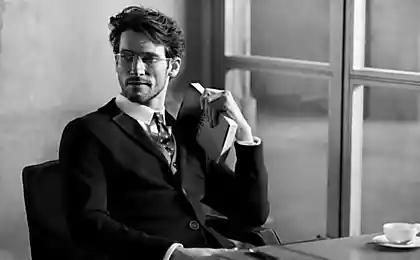721
Threshold theory: How smart do you have to be to succeed
How about becoming a creative genius? Is it possible that Picasso and Mozart used superhuman intelligence to create their masterpieces?
We often think that the reason that we can't do something, is that we haven't found the right strategy or because we weren't born with the right talents. That might be true. Or not?..

Termites
In 1921, at Stanford University, he worked as a Doctor of psychology named Lewis Terman, who decided to conduct an unusual experiment.
Terman started with the fact that he decided to take 1000 of the most intelligent students from third to eighth grade in the state of California. After long tests and searches, Terman collected 856 boys and 672 girls. Later, the children became known as the "termites".
Terman and his team began testing the children. Terman assessed their IQ analyzed how many books each child had in his house, examined their medical history and so on. But this was only the beginning.
What did Terman study unique is that his study was the longest study in the history of mankind, which means that Terman continued to track and test their "children" for many years. This study lasted a lifetime "termite". Terman collected data in 1928, 1936, 1940, 1945, 1950 and 1955 godha, and after he died in 1956, his colleagues continued to monitor the termites and collected data in 1960, 1972, 1977, 1982 and 1986.
Summing up, it should be noted that the study began with the collection of the smartest kids in the state of California, and was tracking their success throughout their life. A few decades later, the researchers found something very interesting...
The Theory Of Threshold
Amazing discovery, which was made possible by the research of Terman is best described by researcher and physician, Nancy Andreasen:
"Although many continue to equate intelligence with creative genius, the main conclusion from the study of Dr. Thurman can be considered that having a high IQ is not equivalent to a high degree of genius. Subsequent studies by other researchers have reinforced Terman's conclusions, leading to the emergence of the Theory of the Threshold, whereby a level of intelligence above a certain level has little influence on human creativity. Most creative people have the ability to create, smart, but not enough to consider them surhomme people. The IQ level of 120, indicates that someone is very smart, but the level is quite sufficient for the Creator..."
Remember our question at the beginning: "is it Possible that Picasso and Mozart used superhuman intelligence to create their masterpieces?"
According to the Theory of Threshold, not necessarily. People with IQ above 120 points (which are very, very few) have no direct relation to their creative potential and IQ. Most likely, there is a minimum threshold of intelligence that you need to have in order to consciously dedicate myself to regular deliberate practice, to begin to spend time on regular repetition of the same exercises (material) and the development of set of skills.
Threshold theory in everyday life
If you look around, you'll see that Threshold Theory applies to many things in our lives. The success rarely is the concept "just work". There is a minimum threshold of competence that is necessary to develop almost any endeavor to achieve significant progress.
After that, it becomes noticeable difference between those who are committed and those who are distracted and "just works." Once you have a basic understanding of the right things and actions, there is a need to follow the right way as often as possible. Once you understand the basics, it all comes down to your habits.
Here is a good examples...
Weightlifting: Assuming you've reached a certain minimum understanding of the effectiveness of certain exercises comes the understanding that the details really don't matter much. Once you have passed this basic threshold, all that remains is to regularly do these exercises periodically increasing the load.
Paul Graham: Where to live now in order to succeed
How our habits create us
Writing: Assuming you understand the basic principles of writing and grammar that determines your ability to write well, it all comes down to the regularity of the process. In other words, after you reach the threshold of a decent quality of his texts, the path to success comes down to the number of written articles.
So in any case you must first step over the threshold of competence, and only after that to build momentum "production". Dry, but in this lies the secret of success. published
Source: muz4in.net/news/teorija_poroga_naskolko_umnym_vy_dolzhny_byt_chtoby_dobitsja_uspekha/2016-08-18-41777
We often think that the reason that we can't do something, is that we haven't found the right strategy or because we weren't born with the right talents. That might be true. Or not?..

Termites
In 1921, at Stanford University, he worked as a Doctor of psychology named Lewis Terman, who decided to conduct an unusual experiment.
Terman started with the fact that he decided to take 1000 of the most intelligent students from third to eighth grade in the state of California. After long tests and searches, Terman collected 856 boys and 672 girls. Later, the children became known as the "termites".
Terman and his team began testing the children. Terman assessed their IQ analyzed how many books each child had in his house, examined their medical history and so on. But this was only the beginning.
What did Terman study unique is that his study was the longest study in the history of mankind, which means that Terman continued to track and test their "children" for many years. This study lasted a lifetime "termite". Terman collected data in 1928, 1936, 1940, 1945, 1950 and 1955 godha, and after he died in 1956, his colleagues continued to monitor the termites and collected data in 1960, 1972, 1977, 1982 and 1986.
Summing up, it should be noted that the study began with the collection of the smartest kids in the state of California, and was tracking their success throughout their life. A few decades later, the researchers found something very interesting...
The Theory Of Threshold
Amazing discovery, which was made possible by the research of Terman is best described by researcher and physician, Nancy Andreasen:
"Although many continue to equate intelligence with creative genius, the main conclusion from the study of Dr. Thurman can be considered that having a high IQ is not equivalent to a high degree of genius. Subsequent studies by other researchers have reinforced Terman's conclusions, leading to the emergence of the Theory of the Threshold, whereby a level of intelligence above a certain level has little influence on human creativity. Most creative people have the ability to create, smart, but not enough to consider them surhomme people. The IQ level of 120, indicates that someone is very smart, but the level is quite sufficient for the Creator..."
Remember our question at the beginning: "is it Possible that Picasso and Mozart used superhuman intelligence to create their masterpieces?"
According to the Theory of Threshold, not necessarily. People with IQ above 120 points (which are very, very few) have no direct relation to their creative potential and IQ. Most likely, there is a minimum threshold of intelligence that you need to have in order to consciously dedicate myself to regular deliberate practice, to begin to spend time on regular repetition of the same exercises (material) and the development of set of skills.
Threshold theory in everyday life
If you look around, you'll see that Threshold Theory applies to many things in our lives. The success rarely is the concept "just work". There is a minimum threshold of competence that is necessary to develop almost any endeavor to achieve significant progress.
After that, it becomes noticeable difference between those who are committed and those who are distracted and "just works." Once you have a basic understanding of the right things and actions, there is a need to follow the right way as often as possible. Once you understand the basics, it all comes down to your habits.
Here is a good examples...
Weightlifting: Assuming you've reached a certain minimum understanding of the effectiveness of certain exercises comes the understanding that the details really don't matter much. Once you have passed this basic threshold, all that remains is to regularly do these exercises periodically increasing the load.
Paul Graham: Where to live now in order to succeed
How our habits create us
Writing: Assuming you understand the basic principles of writing and grammar that determines your ability to write well, it all comes down to the regularity of the process. In other words, after you reach the threshold of a decent quality of his texts, the path to success comes down to the number of written articles.
So in any case you must first step over the threshold of competence, and only after that to build momentum "production". Dry, but in this lies the secret of success. published
Source: muz4in.net/news/teorija_poroga_naskolko_umnym_vy_dolzhny_byt_chtoby_dobitsja_uspekha/2016-08-18-41777
Updated Tesla Model S accelerates to "hundred" for 2,5 seconds
New record prices for solar power in Chile























